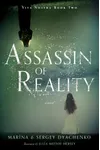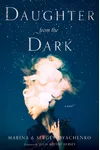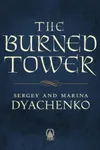Picture a Ukrainian duo weaving tales that blur the line between reality and magic—meet Marina and Sergey Dyachenko! This husband-and-wife team has captivated readers worldwide with their genre-defying 'M-realism,' a blend of fantasy, science fiction, and psychological depth. From their debut novel The Gate-Keeper to the haunting Vita Nostra, the Dyachenkos have redefined speculative fiction with stories that linger like a half-remembered dream.
Born in Kyiv, their unique partnership combines Marina’s romantic, ethereal vision with Sergey’s knack for gritty, structured plots. With over 28 novels, countless awards, and translations in multiple languages, they’ve built a legacy that’s as enchanting as it is profound. Ready to dive into their world?
The Making of Marina and Sergey Dyachenko
Marina (born January 23, 1968) and Sergey (born April 14, 1945) met in Kyiv, where their shared love for storytelling sparked a creative partnership. Marina, a former actress, brought a flair for drama and humanism, while Sergey, a psychiatrist with a biology degree and screenwriting experience, added psychological depth and analytical precision. They began writing together in the early 1990s, debuting with The Gate-Keeper in 1994, a novel that won the Crystal Table prize and EuroCon’s Best Debut Work award. Their move from Ukraine to Russia, and later to California in 2013, shaped their global perspective, infusing their work with universal themes.
Marina and Sergey Dyachenko’s Unforgettable Stories
The Dyachenkos’ works are a masterclass in 'M-realism,' a term they coined to describe their fusion of magical elements with raw human emotion. Their debut, The Gate-Keeper (1994), kicks off the Wanderers tetralogy, following a mage navigating a world of supernatural borders. Its sequel, The Scar (1997), a poignant tale of cowardice and redemption, won the Sword in the Stone award and was praised by Kirkus Reviews for its 'vivid, tactile prose.' Vita Nostra (2007), a standout in their Metamorphosis cycle, explores a surreal school where students undergo metaphysical transformations, earning accolades for its philosophical depth. Wild Energy: Lana (2006), inspired by Ukrainian singer Ruslana, blends fairy-tale energy with modern grit, securing the Bronze Caduceus prize.
Their style is marked by psychological complexity, with characters facing moral dilemmas in chimerical worlds. Whether it’s a dragon-human romance in The Ritual or mythological clashes in Age of the Witch, their stories probe the human psyche, blending Slavic folklore with universal truths. Their ability to craft 'real people in unreal worlds,' as translator Julia Meitov Hersey notes, sets them apart in speculative fiction.
Why Marina and Sergey Dyachenko Matter
The Dyachenkos have left an indelible mark on fantasy and science fiction, earning the European Science Fiction Society’s Best Writers of Europe title at EuroCon 2005. Their works, translated into English, Polish, and more, have introduced Slavic fantasy to global audiences, though challenges like limited translations have kept them under the radar in the West. Their influence extends beyond books, with screenplays like The White Guard and adaptations like He’s a Dragon showcasing their versatility. Despite Sergey’s passing in 2022, Marina continues their legacy, crafting stories that challenge perceptions and celebrate resilience.
- Born: Marina (January 23, 1968), Sergey (April 14, 1945 – May 5, 2022)
- Key Works: The Gate-Keeper, The Scar, Vita Nostra, Wild Energy: Lana
- Awards: Aelita Prize (2001), EuroCon Best Writers (2005), multiple Caduceus awards
Snag Vita Nostra or The Scar and dive into the Dyachenkos’ spellbinding M-realism—you’ll never see fantasy the same way again!




